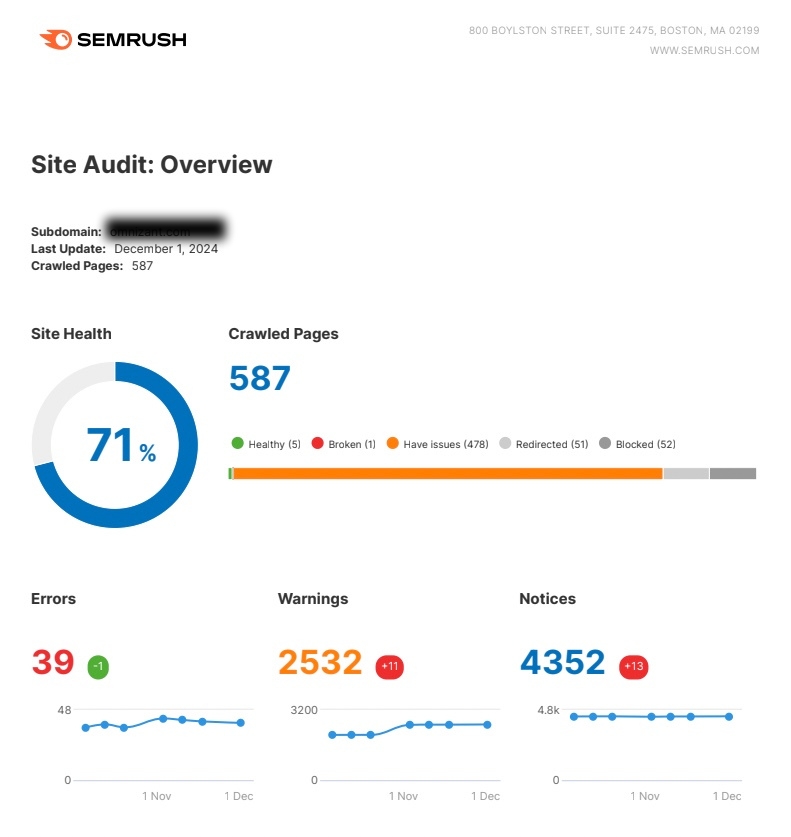Panicking because you heard from a legal marketing agency presenting an automated SEO report? Don’t be fooled—these tools can’t tell the whole story of your website.
We regularly hear from clients in a panic because of automated SEO reports. These reports may position your firm as seriously lacking, with data to back up the claims.
In reality, automated SEO reports often aren’t accurate and they’re better seen as sales tools than actionable insights. SEO is much more nuanced than that.
Here’s what you need to know, including what is an automated SEO report and what it can and can’t tell you about your website’s search engine positioning.
What is an automated SEO report?
An automated SEO report includes data generated by SEO tools like SEMrush, Ahrefs, and Moz.
- Data is aggregated from various sources.
- Report often relies on proprietary algorithms and estimation methods.
- Each tool may claim different metrics, based on its unique algorithm.
SEO reports can help reveal some issues, but they’re often used as sales tools. Claims may be inaccurate or out of context. Automated reports can be a red flag when vetting SEO agencies.

How to Spot an Automated SEO Report
Identifying whether an SEO report is automated or crafted through human analysis can be challenging. Here are some indicators that suggest a report may be automated:
- Dashboard-Like Appearance: Automated reports often resemble the interface of SEO software, featuring dashboard-style layouts with charts and graphs.
- Software Branding: These reports may include the logo or name of the software used to generate them, indicating their automated origin.
- Generalized Statements: Automated reports might make broad claims without providing context or specific examples tailored to your website’s unique situation.
The limitations of SEO reports
Data and metrics from SEO reports cannot tell the whole story of your site’s search engine success.
Metrics will vary between tools: From backlink data to keyword difficulty, SEO tools are guaranteed to return different data due to differences in their data indexing processes. Discrepancies can be large.
Third-party metrics ≠ Google: Metrics like Domain Authority (DA) or Keyword Rankings are estimates created by third-party tools. These are not used by Google for ranking.
Ultimately, Google’s algorithms and proprietary data are not accessible to third-party SEO tools, making direct insights unavailable. Moz, for instance, has clarified that DA is a predictive metric and not a measure used by search engines directly.
This means that dramatic changes in these third-party metrics don’t necessarily reflect changes in how search engines view your site.
Third-party metrics are not direct indicators of search engine rankings. Third-party tools can’t access Google data.
Finally, these automated SEO reports are generalized. In other words, they may overlook specific industry requirements, especially for specialized fields like legal and YMYL content. It’s important to remember that these reports attempt to quantify best practices, but best practices are inherently unique to the needs of each website (and its audience). Consequently, these reports often fail to be useful for anything other than raising a flag on a potential issue that an experienced SEO professional should explore.
What to do if you’re shown an SEO report
While potentially useful, do not use insights from third-party SEO metrics as the sole motivation for any optimization decisions.
- Ask questions.
- Get more sources of data.
- Take a big-picture view.
Please, do not leap into any quick fixes based on an automated SEO report!
First, if you are shown a report that indicates trouble in a certain area, go look for more data. Start with your Google Search Console and Google Analytics dashboards to cut right to the source. Try to corroborate any suggestions from an SEO report with patterns of data from your own site.
Then, work to formulate a more holistic SEO plan to confront any issues. SEO can take time. Focus on what you know (and what experts say) about how search engines work. Let this knowledge inform your strategy.
“Focus on value not numbers.” – John Mueller, Google’s Search Advocate
John Mueller of Google has frequently stated that quick-fix optimizations based on tool-generated metrics tend to fail to produce sustained SEO success. Don’t chase third-party metrics, even when they seemingly help point you to a better SEO strategy overall.
Website owners should focus on quality content and an excellent user experience.
Review and next steps
Before you take any action based on an automated SEO report, use Google’s tools to gain accurate, actionable insights into your website’s performance.
Don’t rely solely on the interpretations of third-party SEO tools. Automated tools have inherent limitations in providing comprehensive and nuanced guidance to lawyers looking to improve their online presence.
Get customized advice for your site with direct-from-the-source data from the SEO experts at Omnizant.

